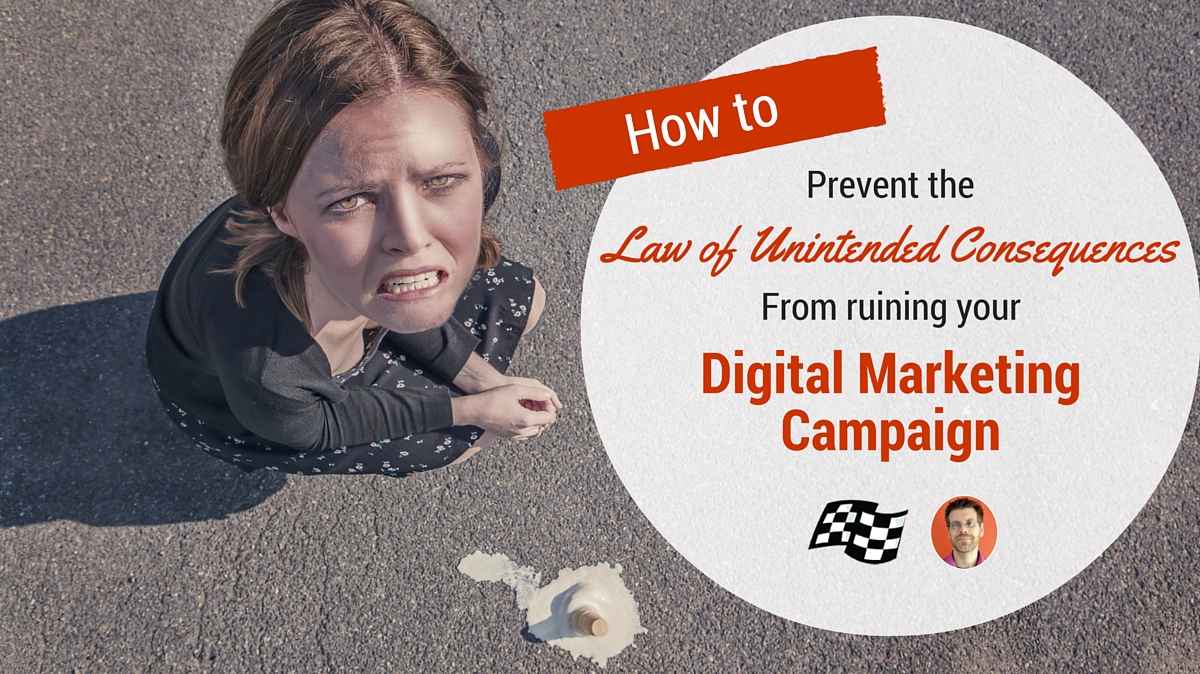
Every day business owners, marketing managers and employees make thousands upon thousands of decisions that will impact the business for which they work. For the most part, these decisions are made on good faith that we are making the world (or at least our businesses) a better place. But as is so often the case in life, there is a law of unintended consequences that we have to watch out for.
This rule is no less at work in the field of web marketing, where every action may cause an equal and opposite reaction–and quite possibly one we never envisioned.
When Good Rankings Go Bad
For the sake of argument, let’s just assume that every change a web marketer makes to a website has a net gain for achieving better search engine rankings. But is that all the web marketer is concerned with? Well, no, because they now have to worry about getting searchers to click from the search results into the site.
It’s entirely possible that the action needed to get a top ranking is also the action that causes fewer people to click into the website. Uh, oh. That’s all bad.
Ok, so now the web marketer isn’t just looking at rankings, but they are also looking at click-through rate. But is that all? Well, no, because they now have to worry about what happens once the visitor lands on the site. Is the visitor engaging with the content, or do they bounce?
But wait, there’s more. Not only do the visitors need to engage with the site, we want to move them down the conversion path. No amount of “time on site” or pages viewed replaces a good old-fashioned conversion.
Your Decisions Matter…
So much of what the web marketer does impacts the bottom line of the business. As much as we want to get rankings, increase engagement or whatever else, the real goal is to grow the business.
But growing the business isn’t what the web marketer is hired to do. Their job is to implement web marketing practices that will help grow the business. Those running the business have a role in that as well.
One thing many business leaders don’t really understand is that decisions they make behind the scenes can have a significant impact on the web marketing campaign. Adding a bunch of products to the site? Talk to the web marketer to make sure you’re not creating duplicate content. Deleting product categories? Again, talk to the web marketer to make sure you do it correctly.
…And So Do the LACK of Decisions
But just as likely, decisions the business leaders are not making can hamper the digital marketing campaign. Any recommendation received from the web marketing team is given for a reason. You may not like the recommendation, or it might take a lot of resources to implement, but that doesn’t make it any less valuable overall.
Deciding not to implement what the web marketing team proposes can–and likely will–have consequences. While rejecting a recommendation may not actually change the current state of your campaign, it can hold back the growth of your business!
The law of unintended consequences works on both sides of the digital marketing relationship. SEOs and business owners must be aware that both taking action and not taking action can have consequences. Every decision, whether it’s doing something or doing nothing, must be weight against the potential ramifications.
Checklist for Good Website Decisions
- Test every change. Even if it’s resulting in a boost in rankings, you need to monitor what it’s doing to conversions.
- Check metrics on a regular basis to ensure your efforts are meeting the ultimate goal: Growing the business.
- Don’t make knee-jerk decisions. Reacting hastily to changes in metrics can result in decisions that do more harm that good.
- Keep your marketing team apprised of any changes you make to your site, no matter how insignificant you think they may be.
- Be careful about rejecting marketer’s recommendations.
